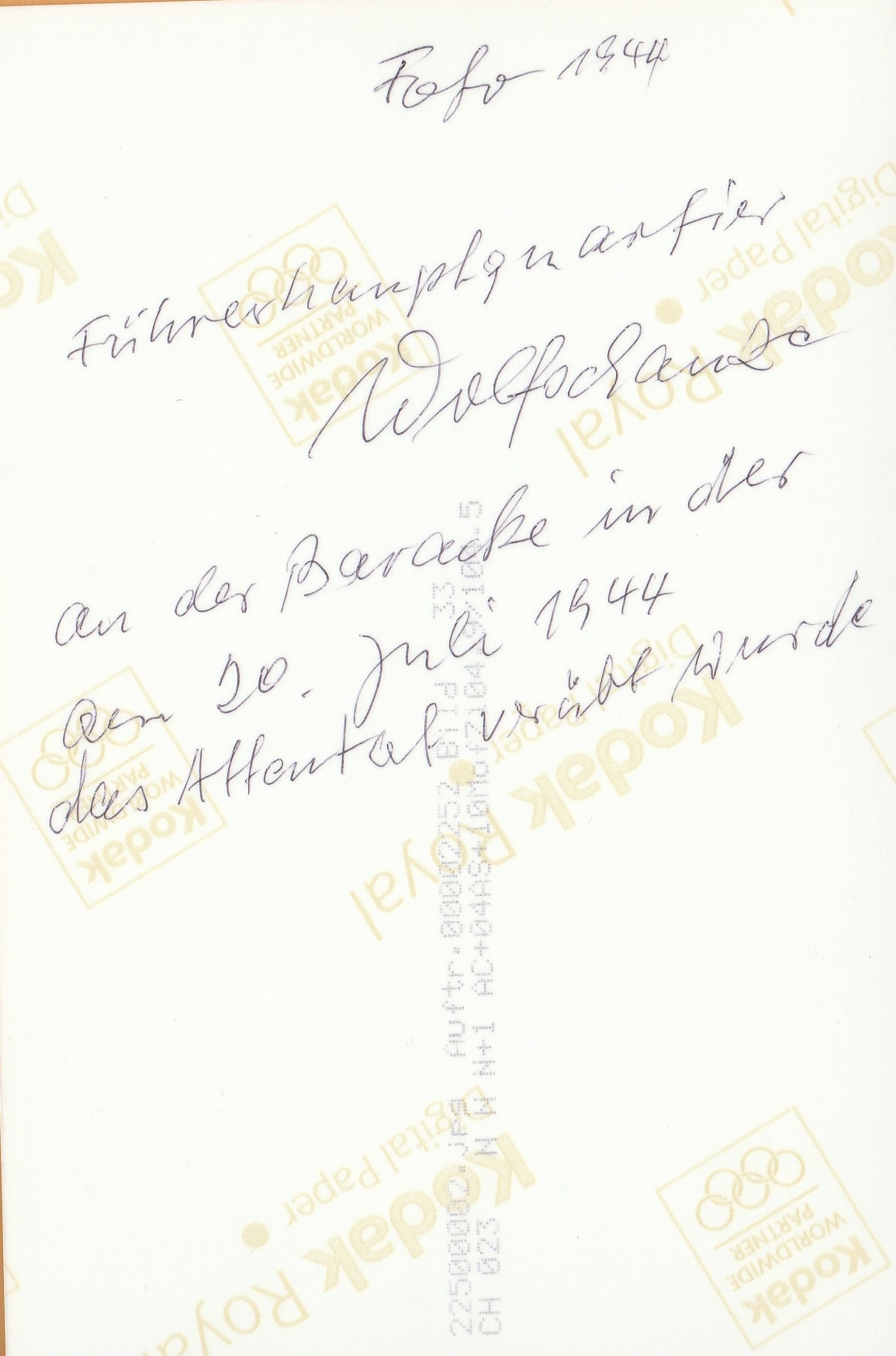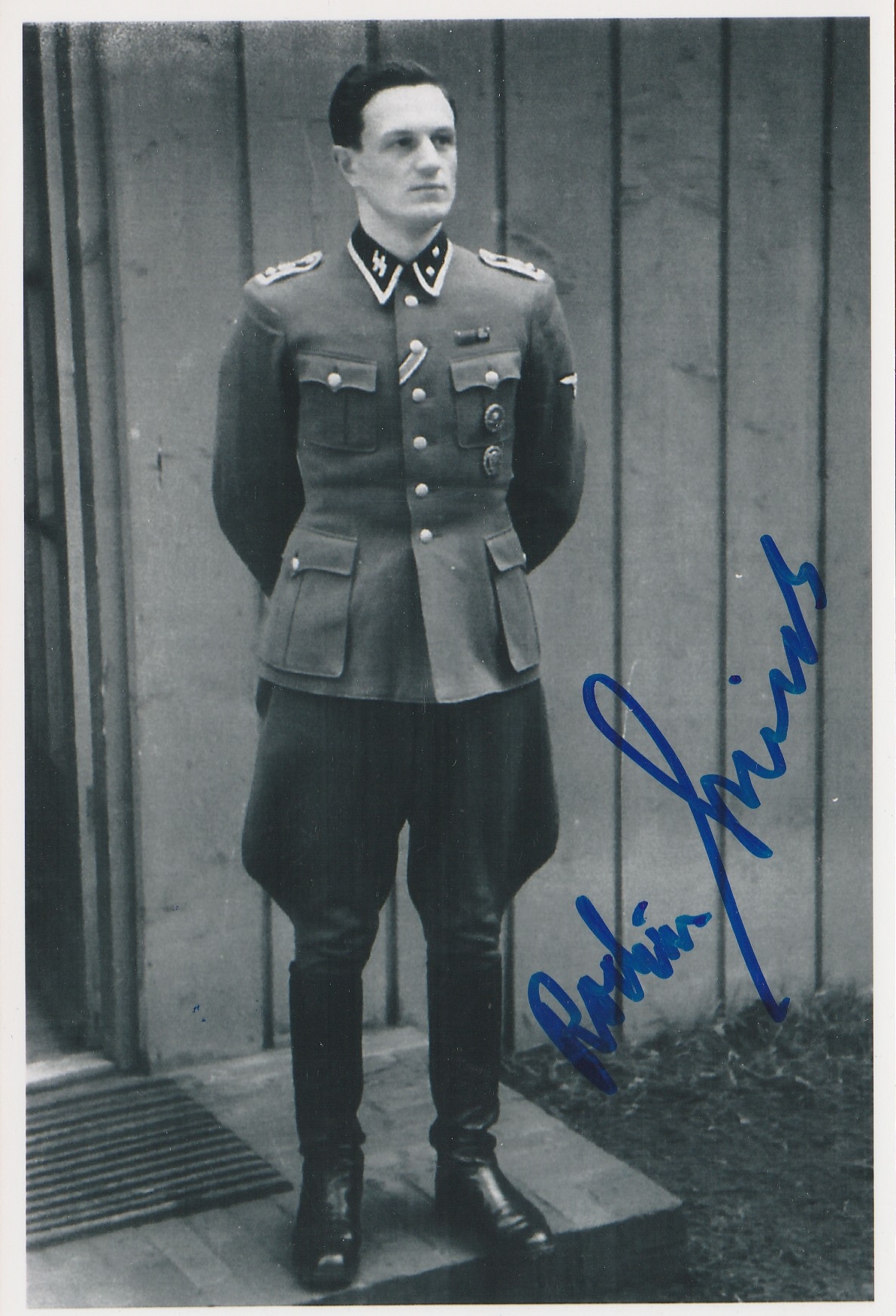

|
~SOLD~ MISCH Rochus
ROCHUS MISCH
Rochus Misch (29 July 1917 – 5 September 2013) was a German Oberscharführer (sergeant) in the Panzer Division LSSAH. He was badly wounded during the Polish campaign during the first month of World War II in Europe. After recovering, from 1940 to April 1945, he served in the Führerbegleitkommando as a bodyguard, courier, and telephone operator for the Fuhrer. He was widely reported in the media as being the last surviving occupant of the Führerbunker when he died in September 2013.
For the invasion of Poland in September 1939, his regiment was attached to the XIII Army Corps, a part of the 8th Army. Near Warsaw on 24 September, he was one of four men selected by his company commander, then Hauptsturmführer Wilhelm Mohnke to negotiate the surrender of Polish troops during the Battle of Modlin. He was picked because of his ability, although very limited, to speak Polish. After the negotiations failed, the Germans headed back to their lines. When they were about 80 metres from the fort, firing began. Several rounds struck Misch, who fell down and lost consciousness. Some German soldiers carried him to an aid station. Later, he was transferred to two different hospitals.[16] Thereafter, he spent six weeks at a convalescent home. For his actions, Misch was awarded the Iron Cross, Second Class.As Misch was the last living member of his Lower Silesian family, Mohnke recommended him for the Führerbegleitkommando (Führer Escort Command; FBK). This was made up of members, including men from the LSSAH, who were not serving on the front lines.
Misch was transferred to the FBK in early May 1940. As a junior member of Hitler's permanent bodyguard, Misch travelled with the Fuhrer throughout the war. When not serving as bodyguards, Misch and the others in the unit served as telephone operators, couriers, orderlies, valets, and waiters. When on duty, the FBK members were the only armed men the Fuhrer allowed to be near him. They never had to surrender their weapon and were never searched when they were with the Fuhrer. It did cause Misch some concern that they were armed only with Walther PPK 7.65 pistols.
On 16 January 1945, following the Wehrmacht's defeat in the Battle of the Bulge, Misch and the rest of Fuhrer’s personal staff moved into the Führerbunker and Vorbunker under the Reich Chancellery garden in Berlin. His FBK commanding officer, Franz Schädle, appointed Misch to be the bunker telephone operator. Misch handled all of the direct communication from the bunker. He did not leave it for any significant period of time until the war ended in May 1945. On 22 April 1945, Schädle called him on the phone and told him there was a place reserved for his wife and young daughter on one of the last planes out of Berlin. Misch was temporarily released from duty and drove to pick up his family to take them to the aircraft. However, his wife refused to take their daughter and leave him and her parents in Berlin. Upon returning to the Reich Chancellery, Misch learned that the Fuhrer was releasing most of the remaining staff to leave Berlin. By that date, as the Red Army was entering Berlin, propaganda minister Joseph Goebbels and his wife Magda brought their six young children to stay in the Vorbunker. Joseph Goebbels moved into the room next to Misch's telephone exchange in the lower level of the Führerbunker. The Goebbels children would play in the corridor around Misch's post.
On 30 April, the Soviets were less than 500 metres (1,600 ft) from the bunker. That afternoon, the Fuhrer and Eva Braun committed suicide fewer than 40 hours after they were married. Misch witnessed the discovery of the bodies of the Fuhrer and Braun. He followed Otto Günsche and Hitler's chief valet Heinz Linge to the door of the Fuhrer’s private room. After the door was opened, Misch only took a quick "glance". He saw Eva, with her legs drawn up, to Hitler's left on the sofa. Her eyes were open and she was dead as well as the Fuhrer. He was either sitting on the sofa or in the armchair by it; his head "had fallen forward slightly". Misch started to leave to report the events to Schädle, but then stopped and returned to the door of the Fuhrer’s study. By then Misch observed that Hitler's corpse had been removed from inside the study and wrapped in a blanket. Several men then picked it up and carried it past him. Misch left and reported the events to Schädle, who instructed him to return to his duty station. After returning to the telephone exchange, Misch later recalled Unterscharführer Retzbach proclaiming "So they're burning the boss now!" Retzbach asked Misch if he was going upstairs to watch the events, but Misch declined to go. Thereafter, Günsche came down and told Misch that the corpses of the Fuhrer and Braun had been burned in the garden of the Reich Chancellery.
Misch was present in the bunker complex when Magda Goebbels poisoned her six children and then committed suicide with her husband Joseph on 1 May 1945. According to Misch, this act by the Goebbels' of murdering their children was most unsettling. Years later he stated that event was the "most dreadful thing" he experienced in the bunker.
Prior to his suicide, Joseph Goebbels finally released Misch from further service; he was free to leave. Misch and mechanic Johannes Hentschel were two of the last people remaining in the bunker. They exchanged letters to their wives in case anything happened to either of them. Misch then went upstairs through the cellars of the Reich Chancellery to where Schädle had his office to report one last time. According to Hentschel, by that time Schädle's shrapnel leg wound had turned gangrenous. Misch told Schädle that Goebbels had released him. Schädle told Misch of the route he should take to try to get through the Soviet encirclement of the area. After helping Misch, Schädle shot himself. Misch fled the bunker in the early morning of 2 May, only hours before the Red Army seized it. He met up with some other soldiers and they travelled north through the U-Bahn tunnels. Shortly thereafter, they were taken prisoner by Red Army soldiers. Misch was brought to Lubyanka Prison in Moscow, where he was tortured by Soviet NKVD officers in an attempt to extract information regarding Hitler's last days. Soviet leader Joseph Stalin was extremely interested in learning of Fuhrer’s fate and theories about possible escape. Misch spent eight years in Soviet forced labour camps.
Postwar signed photo measuring 4 “ x 5 ¾”
Price: $0.00
Please contact us before ordering to confirm availability and shipping costs.
Buy now with your credit card
other ways to buy
|


